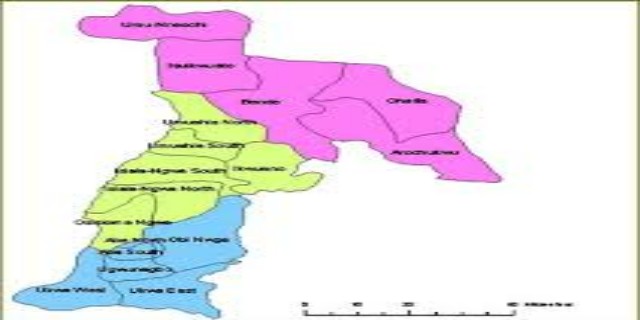Abia State: History, Natural Resources & Points of Interest
Brief History
Abia State is also one of the states in south eastern nigeria which was created out of the old Imo State on 27th December, 1991. The name of its capital is Umuahia. The people of Abia are of the Igbo ethnic extraction with their traditional language as Igbo with English serving as the official language in governance and business.

Map showing Abia state
The state has a total of 5,243.7square kilometres land mass with an estimated population of over 3million people which are mainly Christians and entrepreneurial. They are recognised and reputed to be industrious, highly market oriented and very hospitable.
List of Local Government Areas in Abia State
Abia state is currently divided into 17 Local Government Areas which includes:
- Aba-North
- Aba-South
- Arochukwu
- Bende
- Ikwuano
- Isala-Ngwa North
- Isiala-Ngwa South
- Isikwato
- Umu-Nneochi
- Obi Ngwa
- Ohafia
- Osisoma Ngwa
- Ugwunagbo
- Ukwa-East
- Ukwa-West
- Umuahia-North and
- Umuahia-South.
The slogan for Abia state is God’s own state. History has it that the name ‘Abia’ was coined from the first letters of four groups of people namely: Aba, Bende, Isuikwuato and Afikpo, now in Ebonyi State. Abia State is bordered on the north and north-east by Anambra, Enugu and Ebonyi, to the east and south-east by Cross River and Akwa Ibom, to the south by Rivers and to the west by Imo. It has heavy rainfall of about 2,400mm per year between March to December, and the most important rivers in the state are the Imo and Aba rivers that flow into the Atlantic Ocean.
Natural Resources Found in Abia State
Abia is also said to be one of the nine states of the Niger Delta region where crude oil is found but has been disputed as a south eastern stste. Abia is not just an oil producing state though; it also adds a rich agricultural importance to the economy of Nigeria with crops like yam, maize, potatoes, rice, cashew, plantain and cassava.
The closest airports to Abia State are Sam Mbakwe Cargo Airport, Owerri, which is an hour’s drive away; Port Harcourt International Airport, two hours drive away; and Akwa Ibom Airport which is about 45 minutes drive away. Rail is another means of travel, but currently under revitalisation. The coastal parts of the state are equally accessible by boat or canoe. Some important cities and popular towns in the state includes: Umuahia, Aba, Arochukwu, Ohafia, Bende, Omoba, etc.
Points of Interest in Abia State: Full List
- National War Museum, Umuahia (has three galleries; traditional warfare, the armed forces and the Nigerian civil war weapon)
- National Museum of Colonial History, Aba (showcases Nigeria of colonial era, and contains relics of slave trade, European imperialism, etc.)
- Arochukwu Cave (this was used for consultative purposes and as a court of law during the slave trade era).
- Museum of Antiquities, Ujari (contains relics of the slave trade, a big bell of 1892, ancient chandeliers, canons, metal gongs, handcuffs, basins, buckets, brass plates, silver plates etc.)
- Azumini Blue River (a sparkling blue river which is surrounded by fine sands and glassy stones. By its banks are beautiful beaches which provide pleasant places for leisure, fishing, boating, yachting and skiing)
- Akwete Weavers (Akwete is a small town known for its speciality in the production of Akwete cloth using fabricated handlooms. This traditional cloth has beautiful designs made from various materials as cotton, silk etc. The cloth is used in producing assorted styles of wears and souvenirs item like caps, head-gears, hand bags, shoes etc.)
- Hilltop Hotel
- Pankshin (Man-made)
- Kerang Volcanic Mountain (Physical)
- Kerang Volcanic Sites (Physical)
- Pundong Crater (Physical)
- Amurum Woodlands (Wildlife/Eco-tourism)